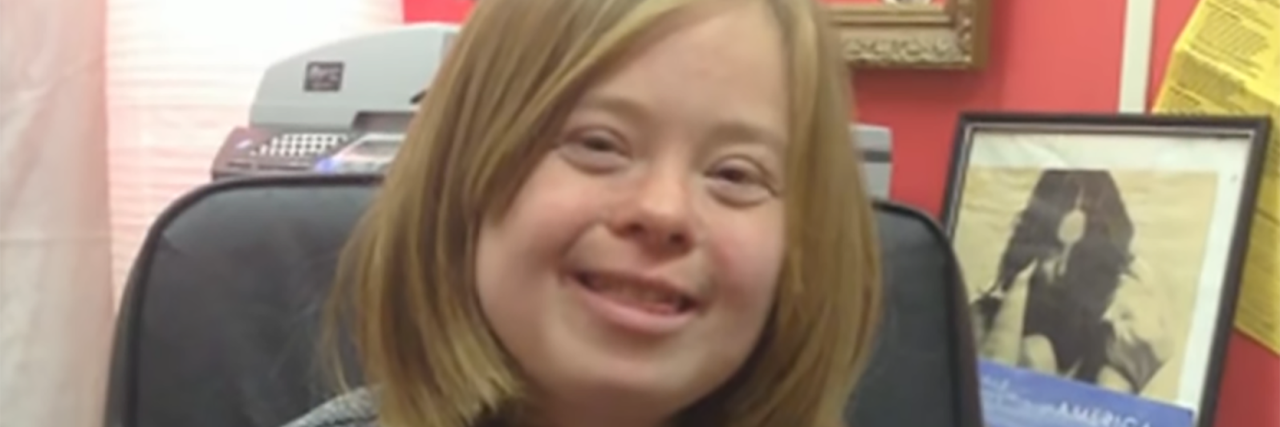Before Britney Spears’ famous case for freedom, there was a 29-year-old woman named Jenny Hatch in Virginia.
“I just need a little help.” That’s what Jenny Hatch told her lawyer Jonathan Martinis when she was fighting for her right to be free of guardianship. Jenny was in a dire situation forced to live in a group home in another city after she had a bicycle accident. Her phone, computer, right to go to her church, ability to go to her job, and ability to make her own choices in life were taken away. Her life as she knew it was taken away. Why? Because her parents had guardianship. Why? Because Jenny Hatch has Down syndrome.
Jenny is a smart, resourceful young woman. She had a job at a local thrift store and had become close with the owners of that store. She was riding her bike to work when the accident happened. When the life that she knew and loved was taken away instantly, and she had to move to another city, Norfolk, she started running away. And she reached out desperately for help. Fortunately, her boss and lawyer Jonathan Martinis stepped in to help. Jenny’s case went all the way to the Supreme Court in 2013.
Jenny’s simple statement saying she just needed a little help is one each one of us lives by. We need help with our taxes, plumbing, certain work around the house, legal situations, etc. Who doesn’t need help at one time or another? Jenny’s determination and drive, her brilliant lawyer, and the love of her close friends combined with true justice for a critical win that has and will help countless others behind her. Jenny Hatch was allowed to be her own guardian, or whatever arrangement she chose, after a one-year period. Along with her newfound freedom, Jenny chose her new family: Kelly Morris, Jim Talbert, and their family. Kelly is Jenny’s boss at the thrift store.
There is far more to this happy ending. Here are just some of the ways that Jenny Hatch’s case has reverberated, for the good.
1) The Jenny Hatch Justice Project was formed and is now helping others. It is “dedicated to advancing people with disabilities’ right to make their own choices and determine their own path and direction in life.”
2) Supported decision-making is now being discussed with parents more and more across the country, as their loved ones turn 18. Supported decision-making is now a popular alternative to guardianship and conservatorship in the U.S. This is the process Jenny and her lawyer advocated for in her case, the way she would get the help she needed. With supported decision-making, people with disabilities choose who they want to help them in their Circle of Support. This circle can be fluid, and is headed by the person with a disability.
3) According to the Washington Post, “Twelve states and D.C. have put in place laws recognizing supported decision-making as a preferred alternative to guardianship.”
4) People and courts are realizing that this concept of freedom and supported decision-making applies to more than people with intellectual disabilities. It can help senior citizens, people with mental illness, people with physical illnesses, and more.
5) We now have some data to show the impacts of supported decision-making. The Arc of Northern Virginia did a pilot project studying 10 people with intellectual or developmental disabilities and their families/caregivers. They were very positive when asked about making their own decisions and working with the project. This is just the beginning of what many hope to see, more data from increased use of supported decision making, and less use of guardianship. I saw this data presented at an Arc meeting, and as a parent of a child with Down syndrome/autism, I found it very refreshing and encouraging.
6) Jenny’s lawyer, Jonathan Martinis wrote a book with Peter Blanck called, “Supported Decision-Making: From Justice for Jenny to Justice for All.” This book is readily available and is an excellent resource for anyone wanting to know more.
The legal world knows about Jenny Hatch’s case. That is a fact. That simple fact is spreading awareness behind the scenes. Behind the “news.” Behind the social media platforms/audiences of a superstar like Britney Spears.
A solid, well-respected Supreme Court victory, a slow but steady rippling effect of supported decision making over guardianship, combined with an impactful Netflix documentary and Britney Spears’ personal win of freedom are huge advancements for countless others in the future. Not one, not two, but now multiple precedents have been set.
This is now a huge part of disability history. A huge step forward. Everyone knows about the Britney Spears case. Now tell them about Jenny Hatch.

